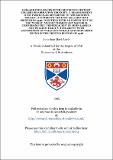Files in this item
Lollard influences in mid-sixteenth century English Reformation thought : a reassessment with particular reference to 'Wicklieffe's Wicket', a fifteenth century Lollard text printed in 1546, together with an edited text of the 'Wicket' and supplementary material comprising the 'Protestacion' of John Lassels and William Tracy's 'Testament' with 'Expositions' by William Tyndale and John Frith found in the printed edition of 1548
Item metadata
| dc.contributor.advisor | Cameron, J. K. | |
| dc.contributor.author | Lovie, Jonathan Mark | |
| dc.coverage.spatial | 2 v. (378, 329 p.) | en_US |
| dc.date.accessioned | 2018-06-12T15:42:09Z | |
| dc.date.available | 2018-06-12T15:42:09Z | |
| dc.date.issued | 1995-07 | |
| dc.identifier.uri | https://hdl.handle.net/10023/13974 | |
| dc.description.abstract | The central part of this thesis consists of an edited text of the 1548/50 edition of Wicklieffes Wicket printed in London by John Day. The absence of a critical edition of this text has prevented historians from adequately assessing its significance either in its Wycliffite or its Reformation context. The Wicket itself deals primarily with eucharistic theology, and as secondary themes with ecclesiology, Christology, vernacular scriptures and the problems of religious language. It is suggested that the origins of the Wicket can be ascribed to no later than the last quarter of the Fifteenth Century, and its theology to Lollardy. In the Sixteenth Century the Wicket appeared with the Testament of William Tracy, a notably Protestant document dating from 1530 which was expounded by both John Frith and William Tyndale, and John Lassels' Protestacion, an eve-of-execution confession of faith written by a Gentleman of the King's Household in 1546. The detailed examination of each text reveals different aspect of Lollardy as it survived in the early Sixteenth Century, and particularly its wide appeal and political influence. It is further suggested that Wycliffite theories of dominion not only helped to justify the Royal Supremacy in 1530, but were also invoked by writers such as Coverdale to counter the extreme Protestants in the early years of Edward VI. The edited texts are inspired by the work of Professor Anne Hudson on Fifteenth Century English Wycliffite texts, and this study attempts to move forward to apply the same disciplines to a notable printed text of the Sixteenth Century. It attempts to assess the influence of Lollard thought in the mid- Sixteenth Century English Reformation, and the conclusions of the study will particularly support Dr. Hudson's view that education was of particular importance in shaping the development of the Reformation by creating an informed but questioning, individualistic attitude among the laity in those areas of the country where Protestantism was embraced at an early date. | en_US |
| dc.language.iso | en | en_US |
| dc.publisher | University of St Andrews | |
| dc.subject.lcc | BX4901.L7 | en |
| dc.subject.lcsh | Lollards | en |
| dc.title | Lollard influences in mid-sixteenth century English Reformation thought : a reassessment with particular reference to 'Wicklieffe's Wicket', a fifteenth century Lollard text printed in 1546, together with an edited text of the 'Wicket' and supplementary material comprising the 'Protestacion' of John Lassels and William Tracy's 'Testament' with 'Expositions' by William Tyndale and John Frith found in the printed edition of 1548 | en_US |
| dc.type | Thesis | en_US |
| dc.type.qualificationlevel | Masters | en_US |
| dc.type.qualificationname | MPhil Master of Philosophy | en_US |
| dc.publisher.institution | The University of St Andrews | en_US |
This item appears in the following Collection(s)
Items in the St Andrews Research Repository are protected by copyright, with all rights reserved, unless otherwise indicated.

